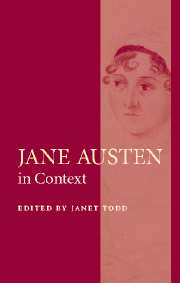15 - Translations
Published online by Cambridge University Press: 19 December 2020
Summary
The diffusion on the Continent of Jane Austen's novels in translation began as early as 1813 with the first French translation of Pride and Prejudice, soon followed by others in French, German, Danish and Swedish. At first sight cultural variety may well seem to prevent the possibility of considering Austen's reception on the Continent as a whole. But if the close analysis of the different translations constitutes a crucial area of Austen scholarship still largely neglected, general observations drawn from the context of European literature in the nineteenth century are necessary, nevertheless, to help readers come to terms with the baffling idiosyncrasies of the individual texts. This explains the structure of this entry, which will offer some general considerations before focussing on a number of examples in French and German.
The early to mid nineteenth-century panorama of Austen’s reception and translation in Europe is generally characterised by gaps and absences, as is well exemplified by the case of Russia. As early as 1816 the journal Vestnik Evropy (‘The European Herald’) published a review of Emma, largely drawn from foreign sources rather than from any direct knowledge of the novel. After this early and promising notice, however, Austen disappeared from the Russian literary domain until the 1850s, when the ‘anglomaniac’ critic Aleksandr Druzhinin mentioned her in an essay about English women writers for the journal Sovremennik (‘The Contemporary’), an overview that also dealt with Maria Edgeworth, Lady Blessington, Felicia Hemans and the Bront ësisters. Nonetheless, these and other occasional mentions of Austen and her work were not accompanied by translations. The first version of an Austen novel in Russian was published as late as 1967.
Furthermore, one observes that, even in those areas of the Continent where Austen's novels were early available in translation, she herself remained a rather unknown figure as a novelist. Her importance was only gradually recognised and her delayed canonisation was an effect of Anglo-American critical evaluations. As late as 2000 the general editor of her Œuvres romanesques complètes, Pierre Goubert, still asserted that Jane Austen is in France ‘un auteur méconnu’.
- Type
- Chapter
- Information
- Jane Austen in Context , pp. 169 - 182Publisher: Cambridge University PressPrint publication year: 2005
- 5
- Cited by



